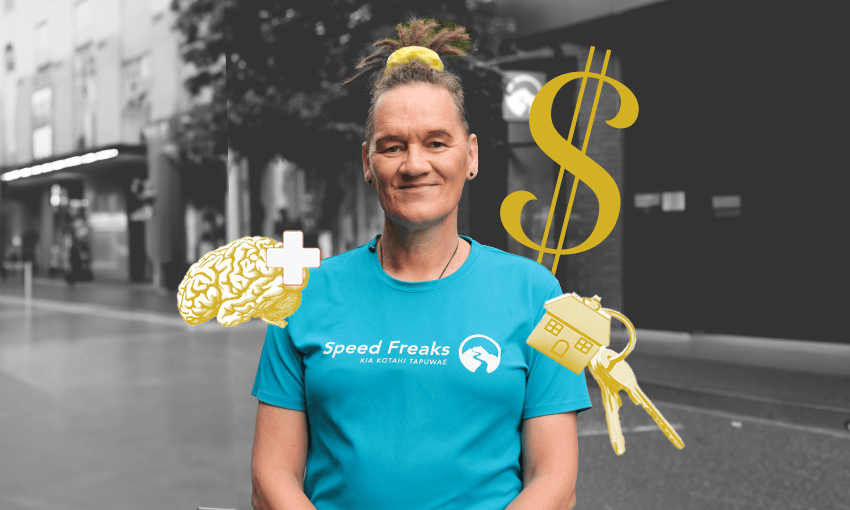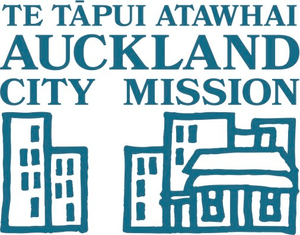Addiction, food insecurity, housing instability and poor health interlink in complex ways. That’s why the Auckland City Mission takes a unique, holistic approach to care, as Naomii Seah discovered when she stopped by.
CW: Mentions of suicide, drug and alcohol use.
You’ve probably heard the adage ‘health is wealth’. But recent research both in New Zealand and overseas shows the reverse is also true.
There is a strong correlation between low income and poor health outcomes. The relationship is complicated and potentially reciprocal – it’s hard to prove if poor health leads to low incomes, or low incomes lead to poor health. Evidence suggests that it’s a combination of both. Low incomes may stand in for a number of other factors like structural and interpersonal discrimination due to ethnicity, sexuality or gender.
In New Zealand, Māori and Pacific people have some of the worst health outcomes, and are over-represented in the lower socio-economic brackets. People in the rainbow community are also likely to experience poorer mental health and wellbeing as well as a higher burden of homelessness and poverty.
So what are the drivers of ill-health and poverty, how are they connected, and how can we address them? These are some of the questions that Auckland City Mission – Te Tāpui Atawhai asks in their mission to serve our most vulnerable.
‘I wanted wellness so much’
Simone Winter used the Mission’s services in her addiction recovery journey. This year she celebrated six years of sobriety. She is now a peer support navigator at Speed Freaks, an organisation that supports people in recovery from addiction through running and walking groups.
For Simone, recovery is an ongoing journey. Her current health has been hard won. Throughout her life, Simone struggled with mental health, anxiety and bipolar disorder, and these struggles led Simone to self-medicate for decades. As a result, she developed alcohol and drug use problems. Unmet mental health and addiction needs led her to make attempts on her life.
“My addiction got pretty bad. I look back and I can’t believe it – what was I thinking? Was I trying to kill myself? But God, if I can change things, anyone can change.
“In 2012 I came out as transgender. It was something I’d known about myself since I was young but I didn’t want to be transgender. I wanted to be like everybody else, and in the 80s there weren’t any role models. I struggled with that.
“If I hadn’t come out [as transgender] then I wouldn’t be here because I was tired of pretending to be someone I wasn’t. I was sick and tired of the trouble that would follow me. I couldn’t hold down a job, I couldn’t keep a roof over my head, financially I couldn’t save anything. I was tired. I had to change.”
Unmet needs
The struggles that Simone faced reflect some of the challenges the Mission seeks to address with its services. The Mission doesn’’t just focus on addiction, mental health or poverty but rather recognises that many people are struggling with the impacts of all three.
The Calder Health Centre is a key part of the Mission’s offering. It’s a low-cost health clinic in Auckland’s city centre that has over 2,000 enrolled patients. The centre’s patient demographic is very different to most primary care centres, says nurse practitioner Lizzy Calder.
“About 5% of our patients suffer from psychosis and about 7% are diabetic. About a third have a drug dependency and around 22 patients are on opioid withdrawal programmes. Most patients are experiencing homelessness or have in the past. The average life expectancy of Calder Centre patients is just 56.”
Mental health is the most persistent unmet need experienced by those accessing support at the Calder Centre. Seventy-two percent of the patient population have chronic mental and physical health challenges.
“I would say 99% of our patients have PTSD… If you’ve lived a lifetime of trauma, it causes immeasurable harm to your brain and body and negatively impacts all aspects of life,” says nurse Lizzy.
She believes that the scale of trauma in Auckland’s most vulnerable populations is not a coincidence. Patients often come in to speak about their struggle with depression, anxiety and PTSD-related symptoms, and the Calder Centre operates with trauma-informed principles.
“There are lots of things we do to ensure that everybody experiences a safe space. A lot of our whānau have high levels of trauma and commonly people who have trauma find it difficult to emotionally regulate. Our receptionists make sure everybody’s alright. We’re also really experienced with de-escalation.”
At the Calder Centre care is non-judgemental and not contingent on things like sobriety. As is true throughout the Mission, care is generally only denied if the safety of others is a concern. In that rare event, the Mission works to connect individuals with other services and means of support. This approach aims to break down barriers to care that vulnerable patients might face in mainstream medical practices.
A holistic housing approach
In addition to healthcare, the Mission also helps with housing. The Calder Centre is located in HomeGround, a Mission building which offers accessible housing and wrap-around social services for people experiencing poverty and homelessness. There is also an onsite pharmacy and community dining room, Haeata, that provides hot meals and activities.
This holistic, integrated approach is one that works, says Helen Robinson, Manutaki | Auckland City Missioner. Part of Robinson’s job is to address the system-level drivers of poverty and poor health. Evidence from overseas shows housing and food insecurity are among the biggest contributors to ill-health.
“One of the key indicators of health in our country is if someone has access to an appropriate, affordable home. It’s not rocket science to say that your health is compromised if you are severely housing deprived. If you’re in emergency housing, transitional housing, your health is compromised until you’re in affordable, appropriate, good quality and permanent housing.”
HomeGround is one of a few sites across the city that offers safe and affordable permanent housing for as long as tenants need. This provides much needed security for those who are homeless or at risk of losing their tenancies, leading to improved health outcomes.
Kai support
In addition to unstable housing, food insecurity is a reality for about 20% of New Zealanders. “If you consistently don’t have enough money for food, it affects both your physical and mental health,” says Robinson.
In 2023, the Mission delivered over 50,000 food parcels to Aucklanders in need. Demand for emergency kai has dramatically increased over the last few years.
Robinson says that while the Mission provides practical support, a lot of the work they do is invisible. “We’re tasked with responding to the reality of suffering right here, right now… but part of the DNA of the Mission is also asking: how come that’s happening? Why is it that women are (unequally) bearing this burden and why is it that Māori and Pacific women particularly are bearing this burden?”
The answers to these questions are complex and require nuanced, equitable and sensitive solutions, says Robinson. Availability, appropriateness and cost of childcare, and ensuring equity in our health and education systems are just some of the challenges that Robinson points to in addressing poverty.
“It speaks to the heart of what we value as a country and what we don’t value. There’s an opportunity there as a nation to face our own shadow.”
Health is wealth
For many, seeking help from the Mission is the first step towards a healthier life, whether the catalyst is improving mental health, quelling hunger or attaining stable housing. As Simone reflects, the Mission’s social detoxification programme gave her vital support and encouragement to take those early steps towards sobriety and the health she so desperately wanted.
At the very start of her journey she joined the Mission’s social detox programme, which gave her vital support and encouragement to take those early steps towards sobriety.
“Getting clean was the hardest thing I’ve ever done because alcohol and drugs affected my mental health in such a bad way, it didn’t matter what medication I was on… I had to get to grips with my addiction.”
After engaging in the Mission’s detoxification treatment Simone continued to work on her physical and mental health. She was able to achieve her Level 4 Health and Wellbeing certificate, which led to a full-time role in healthcare. Later, Simone joined Speed Freaks as a participant. The exercise helped her mental health, but even more importantly she found a community: “the Speed Freaks magic.”
In the past few years, Simone says she’s gotten closer to her family, and she’s been able to build a strong network of relationships, something she found very difficult before recovery. Simone says sobriety has enabled her to manage her finances and each aspect of her wellbeing – mental, emotional, social and physical.
Now in her fifties, Simone beams and says it’s her best decade yet. Although she still occasionally experiences anxiety, she’s now able to manage her emotions and describes her mental health as “amazing, better than when I was a child”.
“I’m grateful for my life. I’m grateful for… the people that I’ve met and all those agencies. It’s nice to be alive. You know, it’s really cool.”
After years of struggle, moments spent at the Mission set Simone on an entirely new path. Now, she’s living proof that health really is wealth, and wealth really is health.

